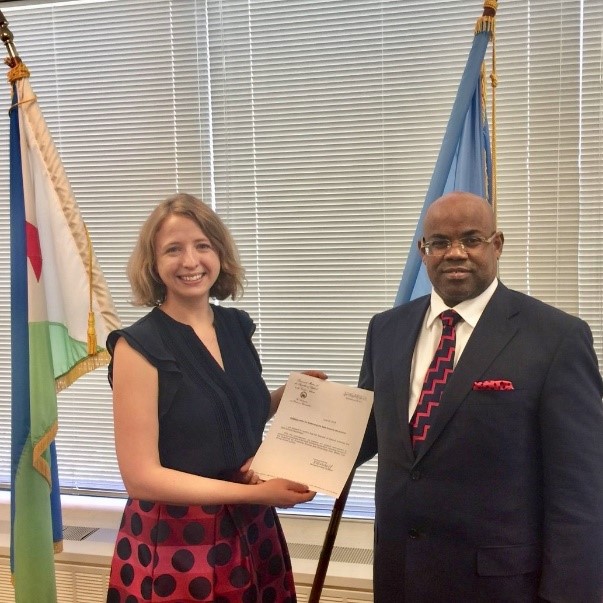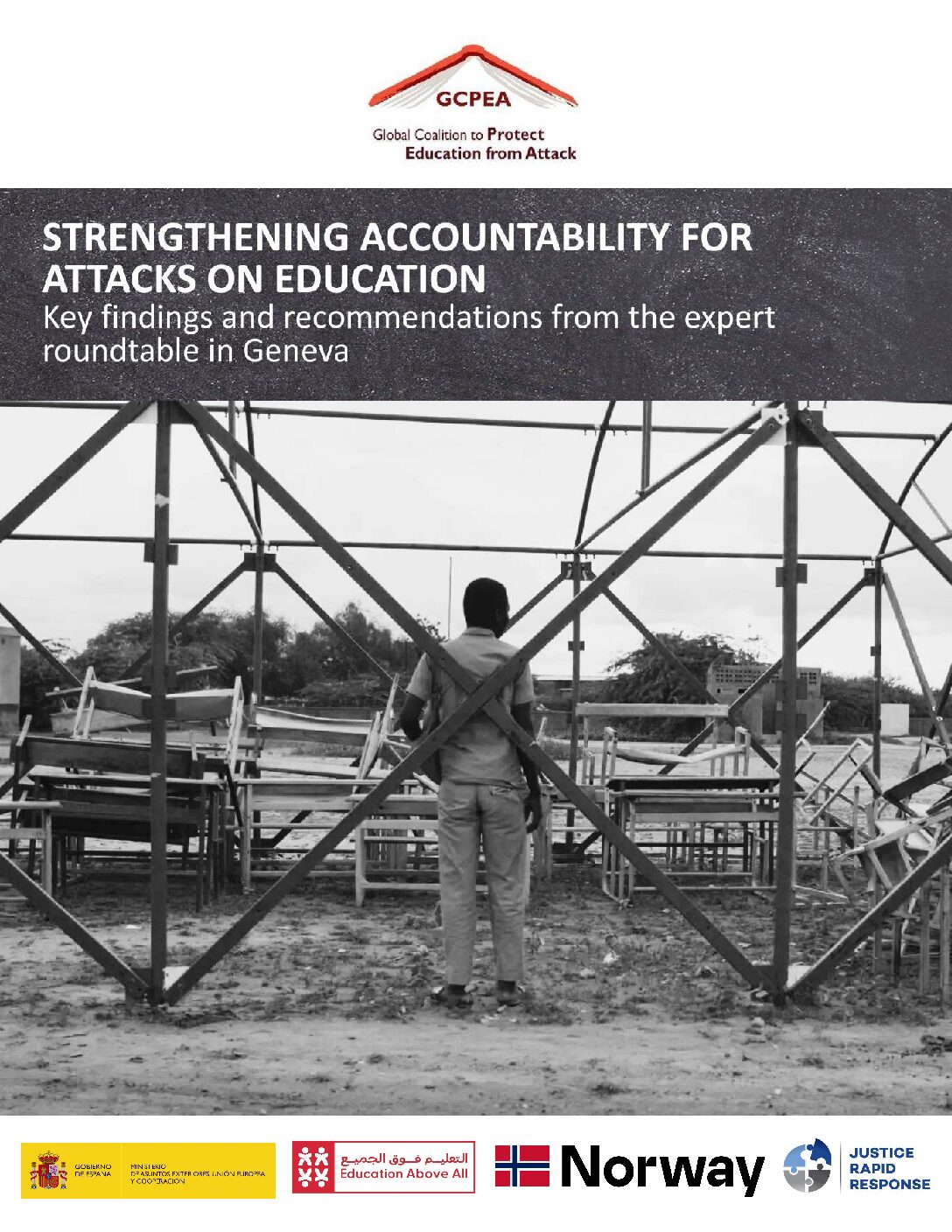GCPEA News
Safe Schools Declaration News #4
GCPEA, September 20, 2018
Welcome to the fourth edition of Safe Schools Declaration News.
The Global Coalition to Protect Education from Attack coordinates advocacy for endorsement of the Safe Schools Declaration, and monitors its implementation. The Declaration is a political agreement that was developed in a state-led process and is co-championed by the governments of Argentina and Norway. This update aims to share developments in the Safe Schools process with interested stakeholders.
- 81 states have now joined the Safe Schools Declaration
- Protecting education a key theme at UN Security Council debate on children and conflict
- Strong support for safe schools expressed across the UN
- UN Security Council open debate on protection of civilians
- Security Council Conclusions on Mali
- CESCR Concluding Observations on Central African Republic
- UN concludes action plans on attacks on schools in two countries
- UN Security Council Arria formula meeting on action plans: Vacation of schools in Sudan
- UN Security Council resolution on youth and peace
- Human Rights Council resolution on the right to education
- ECOSOC Humanitarian Affairs Segment
- Meeting Series: Elevating Education in Emergencies – The Protective Role of Education
- Commissioner Stylianides highlights attacks on education as EU strategic priority
81 states have now joined the Safe Schools Declaration
Since the last update in June 2018, the governments of Cameroon, Djibouti, Macedonia, Monaco, Peru, and San Marino have endorsed the Safe Schools Declaration.
Eighty-one states have now endorsed the Declaration, including a majority of current United Nations (UN) Security Council members, and 22 African Union, 36 Council of Europe, 23 European Union, 24 Francophonie, and 14 Organization of American States members.
By endorsing the Safe Schools Declaration, states commit to use the Guidelines for Protecting Schools and Universities from Military Use during Armed Conflict, which provide practical guidance for armed forces and armed groups to avoid using schools as bases and barracks, weapons stores, training grounds, and for other military purposes.
Protecting education a key theme at UN Security Council debate on children and conflict
In July, Sweden hosted the annual open debate on children and armed conflict as part of its Presidency of the UN Security Council. During the debate, 36 member states – more than one third of all that spoke – referred to the Safe Schools Declaration. Co-champion Argentina delivered a statement on behalf of endorsing states, calling on all states to “recognize the Declaration as a tool to protect children, and to join the Safe Schools Declaration community.” Speaking on behalf of the Group of Friends on children and armed conflict, Canada highlighted the Declaration and its accompanying Guidelines as practical tools that can strengthen the protection of children living through war. Endorsements by four new countries were announced on the day of the debate – Djibouti, Macedonia, Peru, and San Marino. Meanwhile, the representatives of Bolivia and Ukraine indicated that endorsement was under consideration by their governments.
Yenny Londoño, a former child soldier from Colombia, who now works with Grupo de Jóvenes Consultores, spoke about the risks of military use of schools, and also called on governments that have not yet signed the Safe Schools Declaration to do so, highlighting that “we have been waiting on a deferred response from Colombia, among other countries, since 2015.”
Special Representative on Children and Armed Conflict, Virginia Gamba, and the Executive Director of UNICEF, Henrietta Fore, also urged countries to join the growing community of endorsing states. In advance of the debate, Secretary-General António Guterres released his 2018 report on children and armed conflict, in which he repeated his recommendation for all member states to endorse and implement the Safe Schools Declaration. The report took note of positive efforts by the governments of Mali, Nigeria, and Yemen, and urged them to do more to implement their commitments under the Declaration.
For the first time since 2015, a resolution on children and armed conflict was adopted at the debate. Resolution 2427 expresses deep concern about the military use of schools and encourages member states to take concrete measures to deter the use of schools by armed forces and non-State armed groups. In the resolution, the Council calls on UN country-level task forces to enhance monitoring and reporting on military use of schools, and urges member states to ensure that attacks on schools are investigated and those responsible duly prosecuted.
Strong support for safe schools expressed across the UN
An increasing number of states and organizations across the UN are highlighting the importance of protecting schools and universities from attack, and ending the practice of military use of educational infrastructure. Linked to this is growing support for the Safe Schools Declaration as a framework for cooperation among states and other stakeholders in their work to address these concerns.
UN Security Council open debate on protection of civilians
- At the UN Security Council open debate on protection of civilians, hosted by Poland on 22 May, the Safe Schools Declaration was highlighted by the representatives of Germany, Italy, Nigeria, Norway, Romania, Spain, Sudan, Switzerland, and the United Kingdom. The Secretary General’s 2018 report on the topic included several references to attacks against schools and the importance of education. At a media stakeout ahead of the debate, the Deputy Ambassador of the United Kingdom highlighted his government’s endorsement of the Declaration and urged other states to join.
Security Council Conclusions on Mali
- The UN Security Council Working Group on Children and Armed Conflict issued its Conclusions on Mali, in which they commended the government for endorsing the Declaration and Guidelines and called for swift implementation, encouraging the government of Mali to ensure that attacks on schools by armed groups in contravention of international humanitarian law, are investigated and those responsible duly prosecuted. The Working Group also urged armed groups to comply with applicable international law, to respect the civilian character of schools and hospitals, including their personnel, and to end and prevent attacks or threats of attacks against those institutions and their personnel, as well as the military use of schools in violation of applicable international law. Finally, the Working Group urged community and religious leaders to publicly condemn and continue advocating to end and prevent violations and abuses against children.
CESCR Concluding Observations on Central African Republic
- In its Concluding Observations, the Committee on Economic, Social, and Cultural Rights praised the Central African Republic for endorsing the Declaration, stating that “it has acted as a strong incentive for the United Nations Multidimensional Integrated Stabilization Mission in the Central African Republic to safeguard access to schools by protecting them from armed groups”. It also called for the protection of schools from looting and occupation, rehabilitation of schools, and investigation and prosecution of those responsible for such acts.
UN concludes action plans on attacks on schools in two countries
- In June, the Office of SRSG Virginia Gamba announced that an action plan had been concluded between the Mouvement Patriotique pour la Centrafrique (MPC), part of the Former Séléka coalition in the Central African Republic, and the UN. The action plan covers four grave violations, including attacks on schools, making it the first action plan to explicitly address this violation. SRSG Gamba’s office has also concluded an action plan with the government of Sudan on all six violations against children in armed conflict, including attacks on schools.
UN Security Council Arria formula meeting on action plans: Vacation of schools in Sudan
- At the UN Security Council Arria formula meeting on action plans, the representative of Sudan updated the Council on his government’s efforts, in partnership with UNICEF, to vacate and rehabilitate schools. In July 2017, the Sudan Armed Forces circulated a command order to all divisions to prohibit the military use of schools. The government reported that it is in the process of evacuating several schools that had been used by the intelligence services.
UN Security Council resolution on youth and peace
- The UN Security Council adopted a resolution on youth and peace which calls upon member states to: protect educational institutions as spaces free from all forms of violence; ensure that they are accessible to all youth, including marginalized youth; and take steps to address young women’s equal enjoyment of their right to education.
Human Rights Council resolution on the right to education
- In June, the Human Rights Council condemned attacks on students, teachers, schools and universities, which impair the realization of the right to education and cause severe and long-lasting harm to individuals and societies. Due to the efforts of the governments of Canada, New Zealand, Norway, Portugal, Qatar, and Switzerland, strong language was secured in resolution A/HRC/38/L.13 on the right to education. The Council called upon states to make efforts to strengthen the protection of preschools, schools and universities against attacks, including by taking measures to deter the military use of schools.
ECOSOC Humanitarian Affairs Segment
- UNICEF Executive Director Henrietta Fore encouraged additional endorsements of the Safe Schools Declaration during a panel discussion on Addressing the impact of armed conflict on children – strengthening the response to meet children’s needs at the ECOSOC Humanitarian Affairs Segment. Several other panelists also referred to the importance of protecting schools from attack.
Meeting Series: Elevating Education in Emergencies – The Protective Role of Education 
- In June, the Permanent Missions of Norway and Switzerland to the UN in Geneva and the Global Education Cluster co-hosted the first in a series of four meetings aimed at unpacking education’s central role in humanitarian response. The protective role of education in emergencies was the theme of a short video by Save the Children, featuring interviews with children affected by conflict, that was shown during the meeting. During the meeting, almost all panelists referred to the Safe Schools Declaration as a positive development and useful framework for cooperation. A number of speakers from the floor also referred to the Declaration, including the representatives of Mali and Nigeria, the specific countries under discussion during the meeting.
Commissioner Stylianides highlights attacks on education as EU strategic priority
In June, as part of European Development Days, the Directorate-General for European Civil Protection and Humanitarian Aid Operations (ECHO) hosted a side event on protection of education in conflict. The event was opened by Christos Stylianides, European Commissioner for Humanitarian Aid and Crisis Management, who confirmed that one of the European Union’s strategic priorities is to champion education for peace and protection, and to protect education from attack. 
At the event chaired by Monique Pariat, Director General ECHO, Amy Kapit, GCPEA Research Director, presented the findings of Education Under Attack 2018, and the findings of GCPEA’s research on the impact of attacks and military use on women and girls in Nigeria, and Anita Bay Bundegaard, Director of Global Policy for Save the Children, spoke about the development of the Safe Schools Declaration. Other speakers were Sandie Blanchet, Director of the UNICEF Office for Partnership with the EU, Mohamed Sidibay, Global Partnership for Education, and Asma Al Khulaifi, Education Above All Foundation.
Javier Gassó, Deputy Director for UN Affairs, MFA Spain, outlined his government’s plans for the Third International Conference on Safe Schools, to be held in Spain in 2019.
Shortly prior to the event, the European Commission released its Education in Emergencies policy communication. In the policy, the Commission states that it “recognizes and supports the work of the Global Coalition to Protect Education from Attack and will support initiatives to promote and roll out the Safe Schools Declaration”. It refers to the need to combat school closure or “military present in school” and prevent “military use of schools”. While releasing the policy communication, Commissioner Stylianides announced that 10% of next year’s 2019 EU humanitarian budget will be dedicated to Education in Emergencies.






